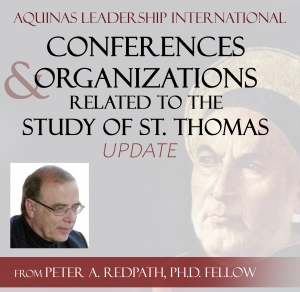- Fr. James V. Schall Reviews A Not-So-Elementary Christian Metaphysics
Immediately below are excerpts from a May 2018 article by Fr. James V. Schall, S.J. entitled “On What is Generated by the Human Intellect.” Full text of the article was published by The New Oxford Review at this link:
“A Not-So-Elementary Christian Metaphysics is a rich book, and Redpath has a clear style. He breaks complicated issues into short, intelligible units. He repeats difficult points, and then he repeats them again, rephrasing them to make them understandable. This is a book I wish I’d had in my earlier years of studies. In reading it, I found that many notions and points I had often wondered about, or about which I needed more explanation, were much clearer after Redpath dealt with them. For us metaphysicians, this is a book of refreshment and a review of what we thought we knew. . . .
A book is an artifact that, once published, is just out there. It awaits a reader who can understand it, who is capable of seeing what truth or error might be found in it. A Not-So-Elementary Christian Metaphysics is one of those rare, to-the-point books that argues forcefully about the heart of things. The book is remarkably whole. It relates the order of the mind and the order of things in a way we seldom see in a brief space. Yes, it remains a difficult book. We must take time to read it. Philosophy, it is said, is the quest for a knowledge of the whole. It is this knowledge that completes each of us and points us to the reality from which and in which we live.
‘The natural human desire to become happy, in turn, can only be satisfied by generating the sciences of metaphysics and ethics,’ Redpath writes. ‘And of these two, ethical activity can only be completely satisfying to the extent to which we are able intellectually to satisfy ourselves that, in this life, we have achieved the best of human goods: a most perfect contemplative knowledge of the beauty of our own souls, that we possess the highest truth and perfect virtue.’ Redpath is not a utopian and does not think everyone will choose and discipline himself to achieve the highest things in this life. But he is right in telling us what we are about when we know both ourselves and what is out there that is not ourselves.
The advantage of this book is its constant, step-by-step guidance to knowing how to achieve such an end of understanding what is, if we would have it. This is the highest service a professor can perform for those who wonder, for those who seek to know reality. And if he is wrong in any of his argument, Peter Redpath wants to be the first to know it and to know why, if indeed he is wrong.
This is a ‘not-so-elementary’ treatise from a man who wrote about ‘how to read a difficult book.’ If we are careful and persistent, when we come to the end of A Not-So-Elementary Christian Metaphysics, we will see that the difficulty was worth it. We will also see, much to our surprise, that metaphysics is the one discipline we dare not neglect. This is, perhaps, why Redpath calls it a Christian metaphysics.”
‘The natural human desire to become happy, in turn, can only be satisfied by generating the sciences of metaphysics and ethics,’ Redpath writes. ‘And of these two, ethical activity can only be completely satisfying to the extent to which we are able intellectually to satisfy ourselves that, in this life, we have achieved the best of human goods: a most perfect contemplative knowledge of the beauty of our own souls, that we possess the highest truth and perfect virtue.’ Redpath is not a utopian and does not think everyone will choose and discipline himself to achieve the highest things in this life. But he is right in telling us what we are about when we know both ourselves and what is out there that is not ourselves.
The advantage of this book is its constant, step-by-step guidance to knowing how to achieve such an end of understanding what is, if we would have it. This is the highest service a professor can perform for those who wonder, for those who seek to know reality. And if he is wrong in any of his argument, Peter Redpath wants to be the first to know it and to know why, if indeed he is wrong.
This is a ‘not-so-elementary’ treatise from a man who wrote about ‘how to read a difficult book.’ If we are careful and persistent, when we come to the end of A Not-So-Elementary Christian Metaphysics, we will see that the difficulty was worth it. We will also see, much to our surprise, that metaphysics is the one discipline we dare not neglect. This is, perhaps, why Redpath calls it a Christian metaphysics.”
